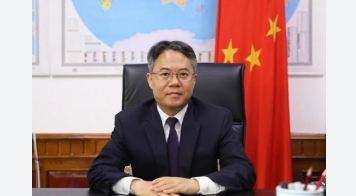ISLAMABAD, Nov 26 (DNA): Chinese Ambassador to Pakistan Jiang Zaidong on Wednesday reaffirmed Beijing’s commitment to supporting Pakistan’s industrialisation, agricultural modernisation and major connectivity upgrades under CPEC Phase II, describing these sectors as central to Pakistan’s long-term economic recovery.
In a video address to senior policymakers, scholars and students at a policy dialogue in Islamabad titled “Redefining Regional Connectivity: Pakistan–China Friendship in the New Geo-Economic Paradigm,” hosted by the BNU Center for Policy Research in collaboration with the Understanding China Forum, Jiang outlined China’s plans to expand cooperation across key productive areas, according to Gwadar Pro.
He announced support for two major upcoming investments: Haier’s USD 400 million home appliance industrial park, designed to produce 10 million units annually, and the Challenge Group’s USD 150 million textile industrial park, expected to generate USD 400 million in yearly exports.
Jiang said both projects would strengthen Pakistan’s export competitiveness, create employment and promote localisation of high-value manufacturing.
Highlighting agricultural cooperation, the ambassador said China would facilitate the inclusion of more Pakistani products under contract farming, improve market access and strengthen value-chain linkages to help diversify Pakistan’s exports and stabilise foreign exchange earnings.
On connectivity, he reiterated China’s readiness to advance several major infrastructure schemes, including the Karakoram Highway (Raikot–Thakot) realignment, modernisation of the Khunjerab–Sost border port and comprehensive upgrades to Gwadar Port.
Transforming Gwadar into a fully functional regional logistics hub, he said, remains a priority under CPEC 2.0.
Reviewing CPEC’s first phase, Jiang said the corridor has attracted USD 25.93 billion in direct investment, added 8,000 megawatts of power to the national grid, built 510 km of motorways and laid 886 km of transmission lines.
He noted that projects such as the China-Pakistan Friendship Hospital and the 2,000-ton-per-day desalination plant in Gwadar have improved access to healthcare and clean water for tens of thousands of residents.
Jiang also praised the Lahore Orange Line Metro Train, calling its operations comparable to Beijing’s transit systems. With ridership surpassing 270 million, he said the project demonstrates the transformative impact of modern urban infrastructure.
He added that the 261,000 jobs created under CPEC reflect its broad social impact and have strengthened public confidence in bilateral cooperation. Jiang also pointed to Pakistan’s recent macroeconomic improvements—including 3.04% GDP growth and rising per capita income—as signs of increasing stability.
The ambassador said China is ready to work with Pakistan to better align development strategies, integrate CPEC with national priorities and build a “closer China–Pakistan community with a shared future.”
Future cooperation, he added, will deepen across industry, agriculture, mining and green development, with the aim of contributing directly to Pakistan’s economic modernisation.
The policy dialogue also featured two expert-led sessions—one on connectivity, cooperation and peace, and the other on the future of regional geoeconomics—bringing together senior policymakers, journalists, academics and practitioners.

















